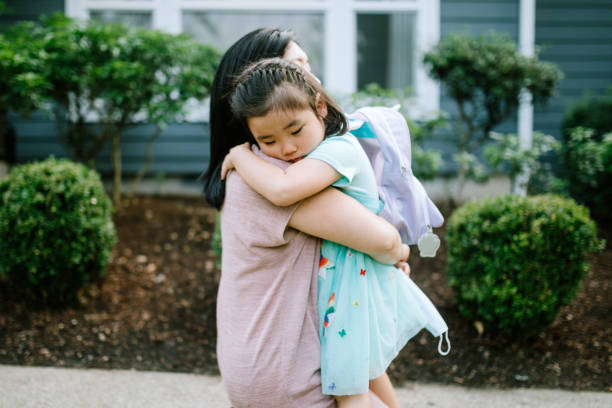Helping a socially anxious child can be challenging, but with the right strategies, it becomes manageable and rewarding. If your child struggles with social situations, you’re not alone. Many parents, like Debbie Weingarten, face similar issues. Her son loves school and soccer but finds drop-offs and new activities overwhelming. Let’s explore some effective ways to support your child.
Understanding Social Anxiety in Children
Many children experience social anxiety, which can make social events like birthday parties and playdates difficult. For example, Debbie Weingarten’s son enjoys his teacher and friends but struggles with drop-offs and sometimes cries when she leaves. This anxiety is often due to a child’s sensitivity to new situations.
Recognising Their Feelings
It’s important to accept that social anxiety is part of your child’s personality, not a deficiency. Rachel Busman, PsyD, a clinical psychologist, advises parents to appreciate this. Recognising and accepting their feelings can reduce frustration for both you and your child.
Adjusting Your Expectations
Adjusting expectations is crucial when helping a socially anxious child. For instance, Emily Popek realised her daughter enjoyed herself even when sitting on the sidelines at events. Accepting that each child has a unique way of enjoying activities can be liberating. Patience and understanding are key in helping your child feel comfortable.
Breaking Down Social Situations

Image from iStock
Breaking down social situations helps identify specific challenges your child might face. Is it separation anxiety, meeting new kids, or being in a big group? Understanding the root cause enables you to develop targeted strategies.
Knowledge is Empowering
Empowering your child with knowledge about social events can significantly reduce their anxiety. Explain the event in detail: where it will be, who will attend, and what will happen. Role-playing and scripting can make social situations feel less intimidating. Kathy Radigan found that simple scripts like “Hi, I’m Tom. What do you like to play?” helped her son break the ice.
Taking Baby Steps

Image from iStock
Gradual exposure to social situations can help your child acclimate at their own pace. Arriving early or late to events can allow them to adjust without feeling overwhelmed. Encourage small steps out of their comfort zone, such as watching other kids before joining in. Weingarten suggests arriving early to new activities to avoid the chaos and settle in slowly.
Praising Small Successes
Every small success your child achieves deserves praise. Positive reinforcement encourages progress and helps build confidence. Dr. Busman recommends acknowledging even the smallest steps, like sitting down to have a piece of pizza at a party. This approach is more effective than pressuring them to engage more.
Finding a Buddy
Having a buddy can ease a child’s social anxiety. Children often feel more comfortable entering social situations with a friend. Dr. Busman notes that many children are more willing to attend events if they know someone there. Dawn Alicot found that introducing her son to other kids with similar interests helped him make friends.
Knowing When to Push and When to Retreat
Balancing gentle pushing with knowing when to back off is essential in helping a socially anxious child. Dr. Busman advises finding a middle path. Push your child gently while respecting their pace. Weingarten highlights the importance of recognising physical symptoms of stress in her son. If your child becomes too overwhelmed, it’s crucial to retreat and help them calm down.
Finding Support for Yourself
Supporting yourself is also important. Connecting with other parents facing similar challenges can provide relief and understanding. Weingarten found comfort in talking to a fellow parent who understood her struggles. Sharing experiences can make the journey less isolating and more manageable.
Takeaway
Helping a socially anxious child requires patience, understanding, and strategic approaches. By adjusting expectations, breaking down situations, empowering with knowledge, and taking baby steps, you can support your child in navigating social challenges. Remember, every small success is a step forward. With these strategies, you’ll find that helping your socially anxious child becomes a rewarding experience, leading to their growth and confidence.
ALSO READ:
Morning Meditation Benefits: 5 Minutes to Lower Stress and Anxiety
Banish Morning Anxiety: Tips and Tricks for a Calmer, More Productive Day
Signs of Separation Anxiety in Babies and How to Deal With Them
 Together Against RSV
Together Against RSV SG60
SG60 Pregnancy
Pregnancy Parenting
Parenting Child
Child Feeding & Nutrition
Feeding & Nutrition Education
Education Lifestyle
Lifestyle Events
Events Holiday Hub
Holiday Hub Aptamil
Aptamil TAP Recommends
TAP Recommends Shopping
Shopping Press Releases
Press Releases Project Sidekicks
Project Sidekicks Community
Community Advertise With Us
Advertise With Us Contact Us
Contact Us VIP
VIP Rewards
Rewards VIP Parents
VIP Parents
